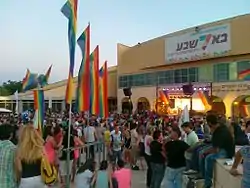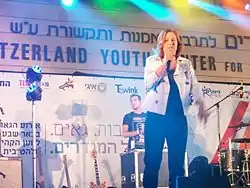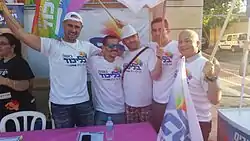The Pride House in Beersheba
The Pride House in Beersheba is a local LGBT organization in Beersheba, Israel, that works for the LGBT community in Beersheba and the Negev, promotes LGBT rights in Israel, Beersheba and the Negev in particular, and has various social activities for the local LGBT community.[1] The organization has been active since 2000, as a local branch of the Israeli LGBT association, and in 2015 separated from the organization and established itself as a separate local organization.[2]
.png.webp)
Activities
The Pride House has an active community center. Most of the community activities take place in the evenings and on weekends. There are groups for diverse audiences: youth, young people, men, women, transgender people, psychodrama, and more. Most groups meet once a week. There are also activities for the general public (LGBT and straight people): lectures, community discussions, Kabbalat Shabbat (Fridays dinners) and more.
The Pride House partners with the Gender studies program at Ben-Gurion University, in a group of Queer Reading students. It participates in lectures and other projects with the local university and the local municipality. Some of its members are guides in the local IGY groups. Some of the activities, such as watching the Eurovision Song Contest etc., which require an appropriate atmosphere, take place in cooperation with the local dance bar "Bialik 26", whose owners are friends and partners of the organization.
In addition to internal activities for the local LGBT people, the organization is active in informational and educational activities for the public in the city, as well as organizing pride events for the general public.
History


The Pride House of Be'er Sheva was established as a local branch of the LGBT association in the end of 1999, in a private house of a local activist. He opened his house to LGBT local groups. Together with other activists, they contacted the National Organization requesting funding for the location of the activity.
On August 2, 2009, following the 2009 Tel Aviv gay centre shooting, the Pride House organized a protest and a spontaneous parade throughout the city of Be'er Sheva. The parade marched from the city's district court, through the municipal market, to the local branch of the LGBT association. About 400 people took part in the spontaneous parade. It was actually the first LGBT pride parade in town, and in Israel south of Tel Aviv. The murderous attack on young people from the LGBT community raised the need for a local center to provide support and clarify the need for a local pride house in Be'er Sheva, which led to continued funding.
A year later, in 2010, the first pride event, "The Pride and Tolerance Event of Be'er Sheva" was held in Be'er Sheva, with the assistance of the Be'er Sheva Municipality, which was attended by about 600 people. A pride parade was not permitted by the local authorities yet.
Ayala Katz, the mother of Nir Katz, who was murdered in the 2009 Tel Aviv gay centre shooting, and later was the head of the Tehila organization, described the event as an instigator for her. "This is my first gay or pride event ever. I wouldn't be here if not the terrible things that happened. And it is clear to me now that parents and the whole community should also be in pride events and fight for the rights of their children, their families and their friends".


In the years that followed, there were bigger pride events, which were attended by famous Israeli singers and entertainers. Requests from the local branch of the LGBT association, and since 2015, from the Pride House to hold a pride parade as in other cities, were not accepted.

At the end of 2014, the LGBT association decided to stop funding the local LGBT centers in Israel. Be'er Sheva's LGBT activists formed the organization of "Pride House in Be'er Sheva", The opening event was attended by Mayor Ruvik Danilovich and many guests. The municipality announced that it supports the local LGBT community and equal rights for all. However, the road to real recognition, such as financing rent to the LGBT center and the approval of a pride parade in the city streets, was still a long way off.
In 2016, the new organization "Pride House" submitted a request to hold a pride event as every year. But this time, unlike in previous years, the Be’er Sheva municipality did not provide assistance to the gay pride event, and no formal approval was given for it. After various requests to the municipality that were not answered, representatives of the pride house in Be'er Sheva asked the police to protest against the lack of funding. A request was made to hold the parade in part of Ragger Boulevard, one of the city's main streets, where marches and other parades are held. Ragger Boulevard was already closed that year, 2016, three times for parades, twice for political demonstrations, and once for celebrating the victory of the Hapoel Beer Sheva team in the national championship.
At first, the police gave permission to hold a parade. Later on, various objections were raised by Rabbi Yehuda Deri, and religious representatives of the municipal council. The rabbi of the city even had a meeting on this matter with the Be'er Sheva police chief. Although the police initially authorized the representatives of the Pride House to march on Ragger Boulevard as a protest march, the permit was later revoked. The Pride House activists was suggested to walk in a side alley in a 50 meter long paved path.
In light of the change in the municipality and the police's position, the Pride House in Be'er Sheva, in cooperation with the Association for Civil Rights in Israel, appealed to the High Court of Justice of Israel, in Jerusalem, in order to instruct the Israeli Police to allow the march on the main street, Ragger Boulevard. In a hearing in the High Court of Justice, which was held the day before the planned march, the judges ruled that the march would not pass on the main street, but would be transferred to a side road. The decision did not stem from the claims of the ultra-Orthodox about their right. Formally, it was claimed by the police that there were threats of the use of firearms and attacks on marchers by opponents of the march.
In light of the claim, the High Court's decision was not to accept the request to march. The Pride House representatives refused to accept a march of only 50 meters in an ally.[3]
Instead of marching, a spontaneous protest took place in front of the city hall at the time of the planned march. The demonstration was attended by thousands of participants, from all over the state, both LGBT people and straights, protesting the surrender of the police and the municipality to a religious and conservative homophobic minority. Ultimately the opponents achieved the opposite of what they had hoped for. The event was covered by the national newspapers and television channels in Israel. Many politicians came to the demonstration and were interviewed. As a result, the Pride House in Be'er Sheva and its LGBT community, were given far more exposure than they would have received just for a local pride parade.
A year after the largest gay demonstration in the history of the city of Be'er Sheva, in June 2017 the Pride House organized the first LGBT Pride Parade in Be’er Sheva with the participation of some 4,000 marchers.[4] At the end of the parade there was a pride event in the production of the Be'er Sheva Municipality, in which the mayor delivered a speech. In his speech, the mayor asked the city's residents to show tolerance and acceptance of each other, in Be'er Sheva, which is a city of communities.[5]
In the same year, a decision was made by the local council to establish an urban LGBT community framework for the LGBT community in the city, as part of the communities' fabric, and to support the LGBT community. The municipality started to finance the community and even helps finance a designated social worker. In March 2017, Beersheba city council announced it will provide a municipal building for the Pride House.[6]
References
- "The Pride House in Beersheba". The face of community. Retrieved 2017-12-26.
- "Beersheba is not a periphery. It's also has a place for pride". GoGay.co.il. Retrieved 2017-12-24.
- Noy, Becca. "Beersheba Mayor expresses his disappointment about canceled Gay Pride Parade". Jerusalem Online. Retrieved 2017-12-24.
- Ben Zikri, Almog. "First Gay Pride Parade to Be Held in Be'er Sheva on Thursday". Haaretz.com. Retrieved 2017-12-24.
- Koriel, Ilana. "Beersheba first gay pride". Ynet.co.il. Retrieved 2017-12-26.
- Ben Zachary, Almog (2017-03-08). "The pride community will receive building from the city". Haaretz.co.il. Retrieved 2017-12-26.
External links
| Wikimedia Commons has media related to LGBT in Beersheba. |
| Wikimedia Commons has media related to Gay Pride in Beersheba. |
- Researcher By Day, LGBT Activist By Night, THE BLOGS, Yanir Dekel, JANUARY 30, 2015
- Yanir Dekel, A scientist / LGBT activist, A wider bridge, January 30, 2015
- LAURA SIGAL, BEERSHEBA GAY PRIDE ORGANIZERS CANCEL PARADE IN PROTEST OF ROUTE CHANGE, The Jerusalem Post, JULY 14, 2016
- Ilana Curiel, More than 2,000 protest Be'er Sheva Pride parade interference, ynet, JULY 14, 2016
- BEER SHEVA’S LGBT HOUSE FINDS NEW HOME, A WIDER BRIDGE, MARCH 7, 2017
- Ilana Curiel, 4,000 attend Be'er Sheva's first ever Pride Parade, ynet, JUNE 23, 2017
- TRAGEDY IN BEER SHEVA: FOUNDING MEMBER OF LGBT CENTER KILLED IN CRASH HOURS AFTER OPENING EVENT, A WIDER BRIDGE, DECEMBER 11, 2017